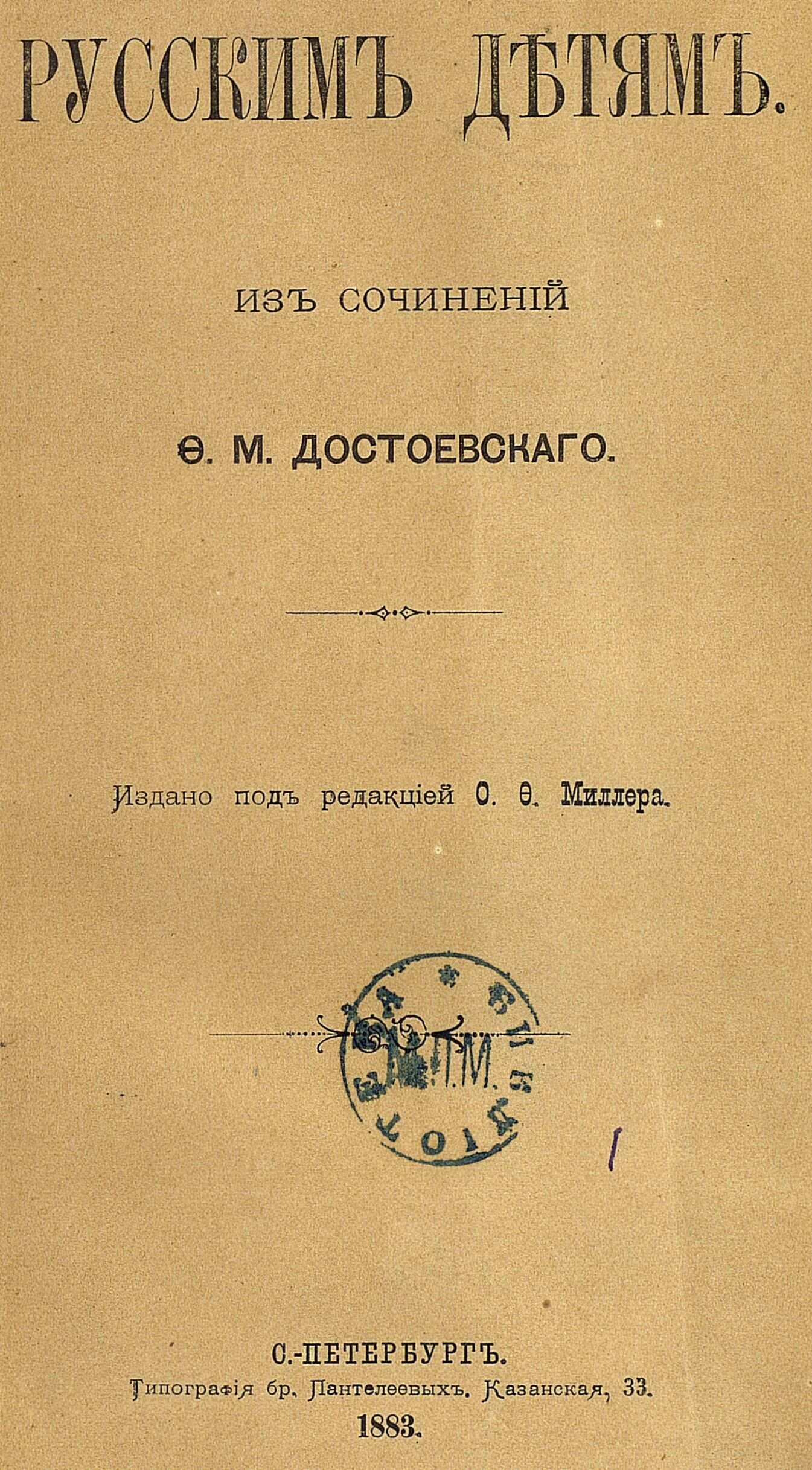A Foreword to Dostoevsky for Parents and Children (1883)
Orest F. Miller's "Foreword" to the 1883 anthology <<For Russian Children. From the Writings of F.M. Dostoevsky.>> With many thanks to Matushka Natalia Sheniloff for the translation.
FOR RUSSIAN CHILDREN
FROM THE WRITINGS OF F.M. DOSTOYEVSKY
Published and edited by O.F. Miller1
ST. PETERSBURG
Printing press of the Panteleyev Brothers. 33 Kazanskaya Street, 1883
TABLE OF CONTENTS2
Foreword.
1) From the Notes by Varinka Dobroselova (from the novel “The Poor Folk”).
2) Netochka and Katya (from the novel “Netochka Nezvanova”).
3) The Orphan Nelli's Story (from the novel “The Humiliated and the Insulted”).
4) Summertime in Prison (from “Notes from the House of the Dead”).
5) The Death of Marmeladov (from the novel “Crime and Punishment”).
6) The Beggar Boy at Christ's Christmas celebration (from “The Writer's Diary,” January 1876).
7) The Peasant Marey (from “The Writer's Diary,” February 1876).
8) The Centenarian (from “The Writer's Diary,” March 1876).
9) Foma Danilov, the Martyred Russian Hero (from “The Writer's Diary,” January 1877).
10) In the Aristocratic Boarding School (from the novel “The Adolescent”).
11) The Elder and the Novice (from the novel “The Brothers Karamazov”):
1. Reminiscences of Monk Zosima.
2. Alyosha.
12) Ilyushechka (from the novel “The Brothers Karamazov”):
1. The School Boys.
2. At the Captain's.
3. Kolya Krasotkin.
4. Zhuchka.
5. At Ilyusha's Bedside.
6. The Doctor.
7. The Farewell.
_______________________________________________________________________
Foreword
Among the many wreaths at F.M. Dostoyevsky's funeral, there was also a wreath from Russian children.
And it was right for this wreath to be there, because the deceased one loved children, knew how to read their souls, and knew how to tell adults what he had read therein. During the last years of his life, his dearest thought was to publish a special book for children that was to include a selection from his writings.
May the book that is now being published serve as a posthumous execution of this intent – a sort of reciprocal gift from him for the wreath from Russian children.
To many people the deceased's gift may seem too sad for the young. It is true that in it there is much about the misery of children and about misery in general. But the deceased justly said that in his writings there is joy as well – only it is spiritual, higher joy. Children will be able to understand this joy, and perhaps no less even than adults.
Misery cannot be hidden even from children who have been most cosseted by fate. Let them store up strength in advance to counter it. Let them become acquainted with those children who never had any idea about luxury and pampering, who from childhood had to battle with life, had to stand firmly on their feet, and even be the support of others.
Let our children learn that to be life's darling meant not to experience what was most precious in it – an active development of strength and victory in a vital and tireless battle.
Let them also learn that there are people who cannot endure life's battle, who come to perform actions under the heaviness of it that embroil both them and their nearest in ultimate misfortune, and can even lead the errant person to loss of freedom – to imprisonment. But let children also learn that this happens mainly if others, more fortunate ones, do not know how to lend a hand to the falling one in time, how to not allow him to fall, or how to raise him up immediately after his fall. Let children learn to understand why people call even prisoners and convicts only unfortunate. Let them learn to understand that even in such people the spark of God may not be completely extinguished, and that the duty of others is not to allow it to become extinguished in them.
This book is a gift for the Christmas celebration, for that Christmas celebration which for a great many children exists only with Christ in heaven. But Christ Himself was born on earth, in order to suffer human misery, but to dissolve it in the joy of love for one another. Let children get Christ's holy joy out of this book, let them take comfort from the fact that if only this joy settles within their hearts – everyone on earth will have a Christmas celebration!
- O. M.
December 6, 1882
For an English translation of most of the pieces see Dostoevsky for Parents and Children on karamazov.ro, a series to be revised and expanded on this blog, with a number of extras like the one above. Also see the Romanian printed edition. (Ed.)






